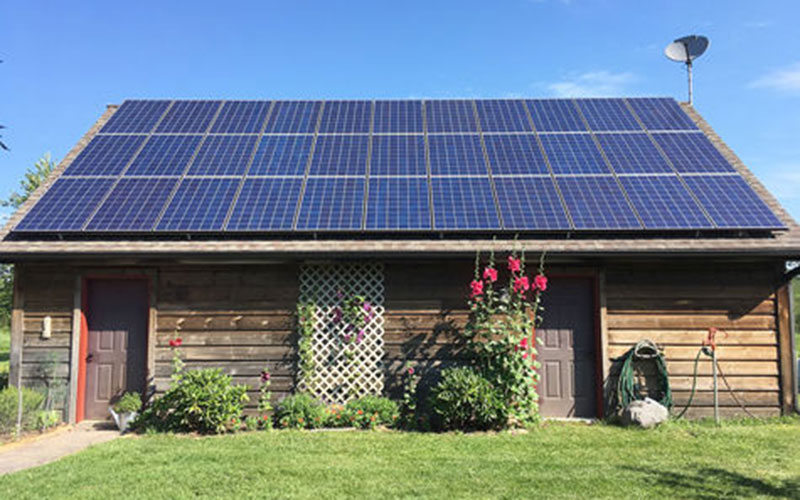
by RENEW Wisconsin | Mar 16, 2022 | Action Alert, Advocacy, Legislative Watchlist, Net Metering, PSC Priorities, Solar
Net metering is a billing policy that enables customers who generate electricity from solar energy to receive a bill credit for the excess energy they add to the grid. This arrangement allows residential and business customers to generate their own electricity, reduce carbon emissions, and provide substantial economic benefits to their communities.
In Wisconsin, net metering varies widely by utility. For example, some utilities use a monthly billing period for netting, while others use an annual period. Some utilities cap systems to 20 kilowatts (kW) for net metering purposes, while others have a 100 kW or 300 kW cap. Due to statewide inconsistencies across utilities, there are opportunities for policy improvements to provide clarity and better reflect the value of solar.
Solar customers and clean energy supporters have an opportunity to submit comments to the Public Service Commission in favor of protecting and improving net metering in Wisconsin. The Commission has asked for remarks on four key questions and shared a 60-page memo from the Regulatory Assistance Project describing net metering policy issues, changes to net metering in other states, and several other aspects for consideration. Comments must be received by 5:00 p.m. on Tuesday, March 22, 2022.
The PSC’s net metering questions (paraphrased):
- Do current net metering tariffs appropriately balance the ratemaking principles?
- Do current net metering tariffs align with the Commission’s mission and state energy policy goals?
- How could net metering tariffs better align with ratemaking principles and policy goals?
- What, if any, further action should the Commission take to review and reform net metering tariffs?
While RENEW is enthusiastic that the Commission is exploring ways to improve net metering, nuances in the memo could undercut rather than accelerate solar growth in Wisconsin. It is critical that any effort to rework net metering in Wisconsin protects the positive features of the current system and carefully evaluates the risks and benefits of any changes. As evidenced by the PSC’s 2021 PV potential study, Wisconsin can expand customer-owned solar, especially with the correct net metering policies. However, opening up the door to changes too quickly may put the current benefits of net metering at risk.
We encourage you to submit comments and share what’s working, what’s not, and why supporting a robust net metering policy is critical for Wisconsin’s clean energy future.
Thank you for your support!
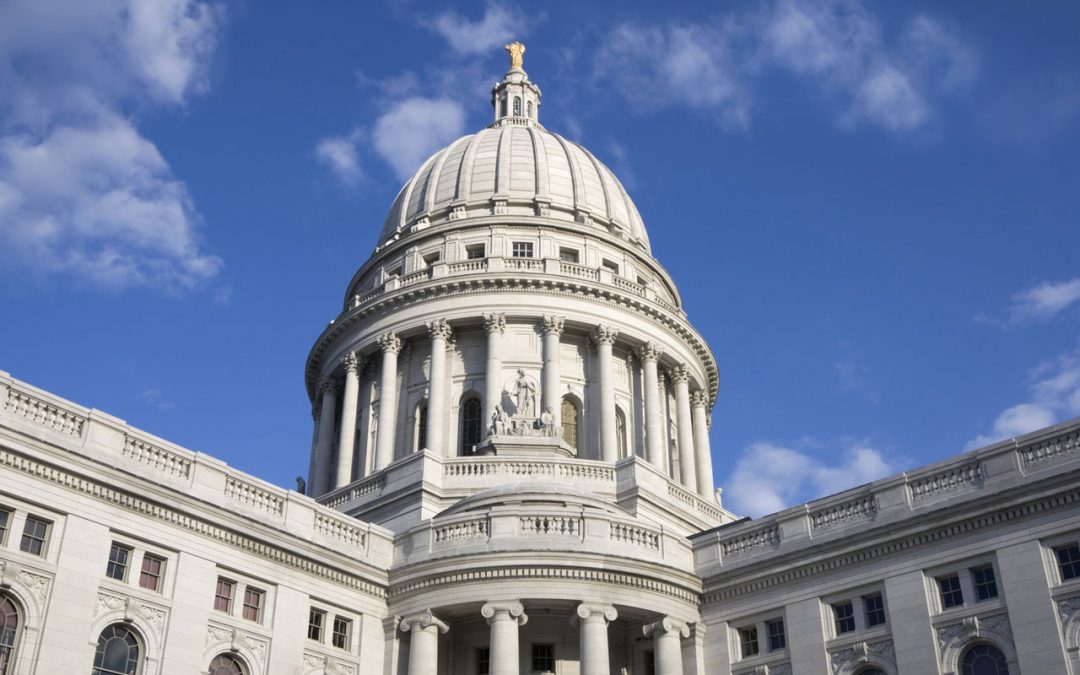
by Jim Boullion | Mar 10, 2022 | Action Alert, Advocacy, Electric Vehicles, Energy Storage, Legislative Watchlist, Local Government
Yesterday, in a unanimous vote of 31-0 (2 not voting), the State Senate voted against concurrence in the Assembly amended version of the EV charging bill, SB 573. The bill aimed to define who can provide EV charging services, how customers will pay for it, and the electricity source for the chargers.
Wisconsin law does not have specific guidance on EV charging, so non-utility-owned EV charging stations set their fees on a per-minute basis, not on the amount of energy delivered. This policy results in owners of slower charging vehicles paying more for power than owners of fast charging vehicles. SB 573 would have allowed businesses to set fees based on the amount of electricity used, but several provisions to the bill concerned clean energy advocates.
“While this bill addressed some of the issues with current policy, it would have also disincentivized solar-powered EV chargers and severely limited local government investment in EV charging,” said Heather Allen, Executive Director at RENEW Wisconsin. “RENEW Wisconsin opposed SB 573 in its current form and applauds yesterday’s Senate decision.”
SB 573 would have prohibited charging a fee if any non-utility-generated electricity was provided through a non-utility-owned EV station. The provision would limit the use of rooftop solar and stand-alone solar+storage EV charging equipment in Wisconsin, which provides numerous benefits such as controlling energy costs, facilitating EV charging in rural areas, increasing resilience and safety, and providing carbon-free electricity.
The restrictions on local government ownership or operation of publicly available EV chargers would have reduced access to EV chargers in many underserved areas because revenue from electricity sales alone may not generate enough income to justify private business investment in small towns, urban streets, or other locations. Local government participation allows EV infrastructure to expand in areas where private businesses are not investing.
“While this particular legislation did not pass, the issues the bill was attempting to resolve remains unsettled,” said Jim Boullion, Director of Government Affairs at RENEW Wisconsin. “RENEW Wisconsin will continue to work towards better policies that help everyone in Wisconsin benefit from the fast-developing electric vehicle revolution.”
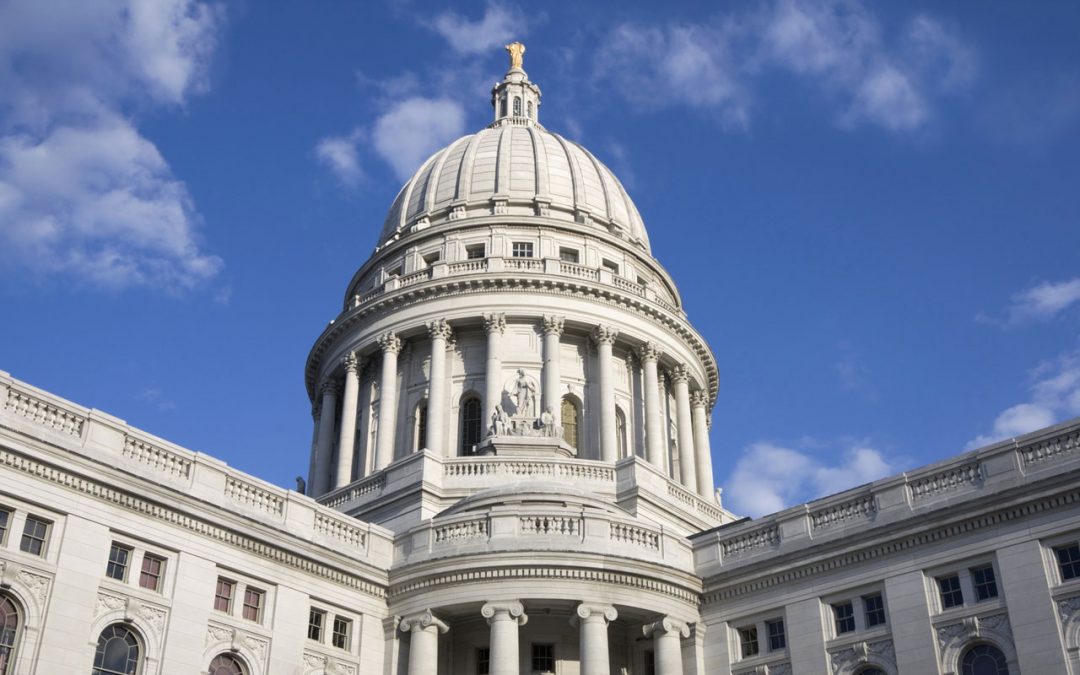
by Jim Boullion | Feb 23, 2022 | Action Alert, Advocacy, Electric Vehicles, Legislative Watchlist
On February 15th SB 573 passed the State Senate on a (mostly) partisan vote of 19-13. All Democrats voted against the bill. Sen. Steve Nass was the only GOP Senator who voted against it.
The State Assembly has placed the bill on today’s floor calendar (Wednesday, February 23rd) for a vote. If it passes the Assembly the bill goes to the Governor for his consideration.
RENEW Wisconsin is opposed to the bill in its current form (Senate Substitute Amendment 3). While this legislation clarifies that selling electricity to electric vehicles (EVs) by the minute or kilowatt does not subject EV charging station owners to utility regulation, it has several provisions that are of concern:
- Requires that all electricity sold through an electric vehicle charger must come from the local utility. This stipulation would prohibit EV chargers that get any of their electricity from a non-utility-owned rooftop or standalone solar+storage system from being available to the public if they charge a fee.
- No local governments, which includes cities, villages, towns, counties, school districts, special purpose districts, or any state agency, may own, operate, manage, lease or control an EV charging facility available to the public. Local governmental units may authorize a utility or private entity to operate a charger on their property.
For background, you can view RENEW’s testimony on this bill here.
Please contact your legislators in the Assembly and ask them to oppose this legislation unless those issues are corrected!
Thank you for your support!
Please email RENEW Wisconsin Director of Government Affairs, Jim Boullion, if you have any questions.

by Jim Boullion | Feb 14, 2022 | Action Alert, Advocacy, Electric Vehicles, Legislative Watchlist
On Friday, February 11th SB 573 was recommended for passage on a 3-2 vote by the Senate Committee on Utilities, Technology, and Telecommunications. The bill was immediately put on the State Senate floor calendar for tomorrow, Tuesday, February 15th. If the bill passes the Senate, it will go to the State Assembly, where it would be available for full adoption at any time before the end of the floor session on March 10th.
This legislation clarifies that selling electricity to electric vehicles (EVs) by the minute, kilowatt, or other means does not subject EV charging station owners to utility regulation as long as the owner meets several requirements. Among those requirements in the amended bill are several provisions that are of concern:
1. Requires that all electricity sold through an electric vehicle charger must come from the local utility. This stipulation would prohibit EV chargers that get any of their electricity from a non-utility-owned rooftop or standalone solar+storage system from being available to the public if they charge a fee.
2. No local governments, which includes cities, villages, towns, counties, school districts, special purpose districts, or any state agency, may own, operate, manage, lease or control an EV charging facility available to the public. Local governmental units may authorize a utility or private entity to operate a charger on their property.
For background, you can view RENEW’s testimony on this bill here.
Please contact your legislators in both the Senate and Assembly, and ask them to oppose this legislation unless those issues are corrected!
Thank you for your support!
Please email RENEW Wisconsin Director of Government Affairs, Jim Boullion, if you have any questions.
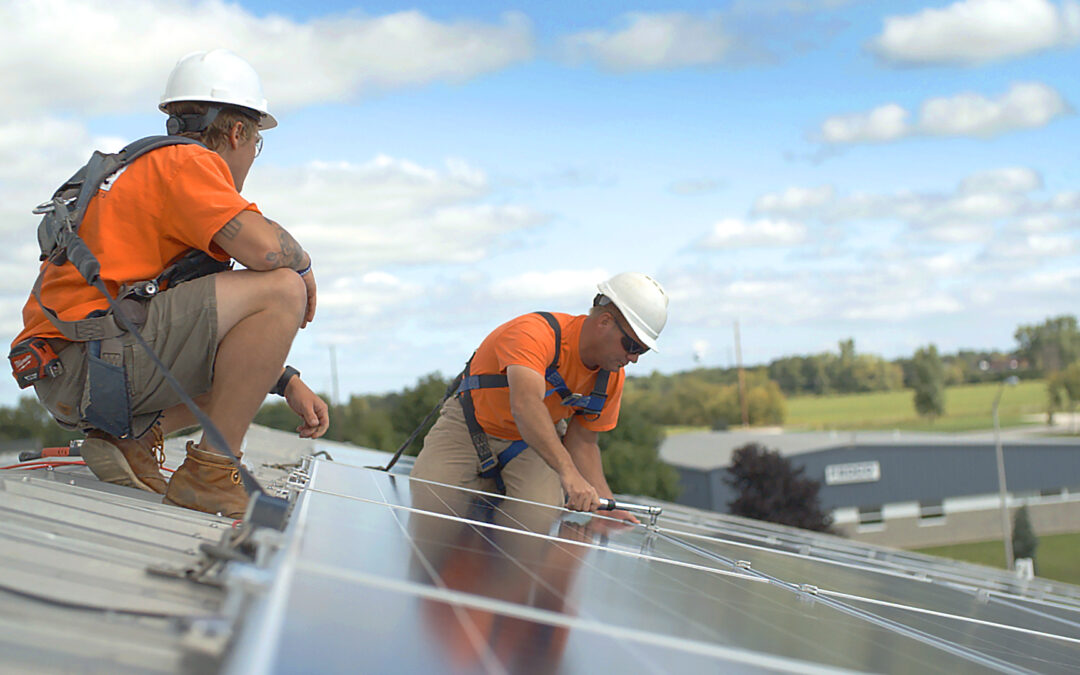
by Heather Allen | Feb 2, 2022 | Advocacy, Legislative Watchlist, Local Government, Policy
Federal clean energy and climate investments are more crucial than ever. Congress must deliver a deal that includes clean energy investments in the Build Back Better Act.
This is a make-or-break moment to shore up the electric grid and help accelerate renewable energy and energy efficiency adoption in the U.S. These investments will make the difference between leading the global clean energy economy or lagging behind the rest of the world.
According to the Solar Energy Industry Association, the Build Back Better Act would drive $234 billion into the economy over the next four years and require at least 450,000 workers to get it done – double the size of today’s solar workforce!
In the last few weeks of 2021, the Build Back Better Act (Biden’s flagship climate and clean energy proposal) hit roadblocks. Regardless of the political stalemate, the critical importance of the Act’s clean energy and climate provisions cannot be overstated. As Stewart MacKintosh wrote in The Hill, “Achieving global climate change goals depends on the U.S. starting to implement Biden’s net-zero carbon emissions plan today- not two (or god forbid) four or more years from now. We have no extra time.”
The Build Back Better (BBB) Act is the third and most ambitious part of Biden’s original Build Back Better plan, including COVID-19 economic relief, social services, welfare, and infrastructure. Significant portions of the agenda were signed into law with two bills in 2021, The American Rescue Plan Act (March 2021) and the Infrastructure and Jobs Investment Act (November 2021).
BBB is the most powerful tool the Federal Government has in play to curb U.S. emissions and reach the climate and clean energy goals established in the Paris Agreement. BBB provisions would mobilize billions of dollars to expand access to clean energy and electric vehicles, improve the efficiency of buildings, electrify heating and cooling, support American clean energy industry growth, and help American manufacturers and other businesses reduce energy use and emissions. BBB also contains funding for social infrastructure, environmental justice investments, natural climate solutions, and rental assistance.
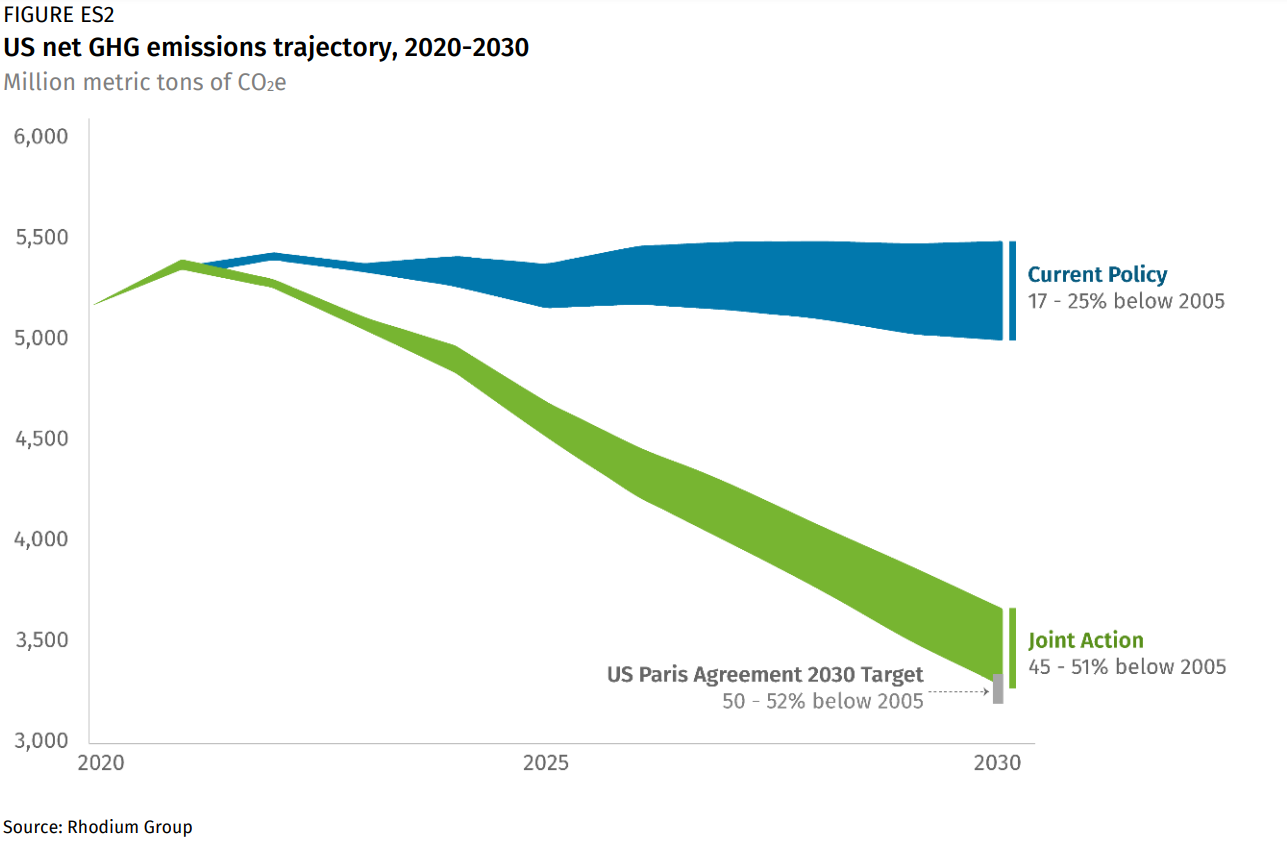 Image/Figure from https://rhg.com/research/us-climate-policy-2030/
Image/Figure from https://rhg.com/research/us-climate-policy-2030/
This figure from the Rhodium Group shows that “Joint Action” can reduce emissions by 50% below 2005 levels. Joint Action refers to the collective impact of legislation adopted in 2021, BBB climate and clean energy provisions, and state and local action. BBB is the most critical element in this suite of actions and will accelerate clean energy adoption, save money for consumers, and reduce emissions.
Businesses and Workers Support Build Back Better
Last summer, Wisconsin businesses signed a letter calling on Congress for ambitious clean energy investments. Since that time, an increasing number of companies and organizations have signaled their support for clean energy investment to drive jobs and economic activity.
West Virginia coal miners called on Joe Manchin to support Build Back Better.
Provisions in the bill would support miners dealing with Black Lung Disease, provide incentives to develop clean energy projects on closed mines, and support the right to unionize.
400 companies signed a letter calling on lawmakers to pass Build Back Better.
“The climate components of the Build Back Better package are both fiscally responsible and critically needed to ensure a stable climate for businesses and communities, help companies save money with affordable clean energy, and strengthen U.S. competitiveness by building upon the important measures in the infrastructure package that passed Congress this fall,” said Hugh Welsh, president and general counsel, DSM North America.
Wisconsin’s solar installers, in particular, recognize that Build Back Better will provide greater access to clean energy, especially for farms and low-income families.
“The extension of the business and residential tax credits for solar are critical for our industry. But adding refundability to both 48C and 25D is a game-changer for low and moderate-income households, farms, and other entities that don’t have the tax liability to realize the normal tax credits and finally enables them to go solar. It has the potential to bring the equitable distribution of the benefits of solar to millions.” Josh Stolzenburg, CEO Northwind Solar, Amherst, Wisconsin.
Contact your senator today and ask them to support climate and clean energy provisions of Build Back Better. There is no time to waste.

by Jim Boullion | Feb 1, 2022 | Action Alert, Advocacy, Electric Vehicles, Legislative Watchlist
AB 588 / SB 573 (Sen. Cowles and Rep. VanderMeer) will have a hearing in the State Senate and a committee vote in the Assembly this week at the State Capitol. This legislation attempts to clarify that selling electricity by the kilowatt-hour (instead of by the minute as is the current practice) to electric vehicles (EVs) does not subject EV charging station owners to utility regulation. However, the bill has been amended with several provisions that are of concern:
- Requires that all electricity sold through an electric vehicle charger must come from the local utility, prohibiting EV chargers that get any of their electricity from a rooftop or standalone solar+storage system from being available to the public if they charge a fee.
- No city, village, town, county, school district, or state agency may own, operate, manage or lease a publicly available charging facility. Municipalities may authorize a utility or private entity to operate a charger on their property.
The Senate Committee on Utilities, Technology, and Telecommunications has scheduled a Public Hearing on SB573 for Wednesday, February 2, 2022, at 10:30 am, 400 Southeast. The public may testify at this hearing. Keep testimony under 5 minutes and provide a written copy if possible.
Members: Julian Bradley (Chair), Roger Roth (Vice-Chair), Van Wanggaard, Brad Pfaff, Jeff Smith
Assembly Committee on Energy and Utilities has scheduled an Executive Session to vote on AB588 on Thursday, February 3, 2022, at 11:00 am, 412 East, State Capitol, Madison. There is no public testimony at this hearing (the public hearing was in October). View RENEW’s testimony on this bill here.
Members: Mike Kuglitsch (Chair); David Steffen (Vice-Chair); Travis Tranel; Loren Oldenburg; Warren Petryk; Adam Neylon; Tyler Vorpagel; Gary Tauchen; Kevin Petersen; Cody Horlacher; Beth Meyers; Lisa Subeck; Deb Andraca; Supreme Moore Omokunde; Sara Rodriguez
Please contact your legislators, especially if they are members of one of those committees, and express your concerns with this legislation.
We also encourage you to attend the hearing in the Senate Utilities Committee on February 2nd to oppose these restrictions.
Thank you for your support!
Please email RENEW Wisconsin Director of Government Affairs, Jim Boullion, if you have any questions.





